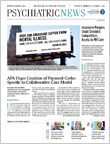Psychiatry departments typically turn to their local neuroscience expert when it’s time to talk about neurocircuitry—an accomplished lecturer, but one not necessarily trained in how to make these concepts accessible in clinical learning.
Melissa Arbuckle, M.D., Ph.D., co-chair of the National Neuroscience Curriculum Initiative, wants to change that. “The goal of the curriculum is to transform the teaching of neuroscience into an active, hands-on learning experience—one that also makes it clear to students how neuroscience is linked to clinical presentation,” she said.
The curriculum consists of six online learning modules that can be freely used by training programs:
•
Neuroscience Lab. Bringing core concepts of neuroscience to life through experiential learning.
•
Neuroscience in the Media. Exploring the interface between neuroscience, the media, and psychiatry.
•
Translational Neuroscience. Examining how cutting-edge neuroscience research might change the future of psychiatry.
•
Integrated Case Conference. Incorporating a neuroscience perspective as a core component of case formulation.
•
Talking Pathways to Patients. Learning how to talk to patients about neural pathways that underlie specific disorders.
•
Fundamentals of Neuroscience. Enhancing foundational knowledge of neuroscience and psychiatry through videos and other activities.
One session of “Talking Pathways to Patients” features an online video of a psychiatrist talking to a patient with an addiction to heroin. “The psychiatrist is explaining the reward circuit in the brain, how it normally operates, and how it gets hijacked when a person uses heroin,” Arbuckle explained. “The students see the clinician engaging with the patient about how to use an understanding of the underlying neuroscience of addiction to put together a comprehensive treatment plan.”
Students are then invited to role-play with a fellow student so they can practice how they talk about these pathways to a patient. “It’s very different from sitting and listening to a lecture,” Arbuckle said.
Similarly, an exciting new module under development is “Clinical Conversations,” which involves bringing neuroscience into the real-time clinical experiences that residents encounter.
“So far we have focused on making classroom teaching more interactive,” she told Psychiatric News. “But 90 percent of learning is what we call ‘informal learning,’ the spontaneous teaching that takes place in a clinical encounter. The next step in neuroscience education has to be to make it embedded in the actual clinical experience of trainees—translating it from the classroom to the clinic.”
According to Arbuckle, some 22 training programs around the country are using the modules. The NNCI website has hosted over 5,760 users and has had 30,200 page views since March. The 2016 BRAIN Conference, held in conjunction with the meeting of the American Association of Directors of Psychiatric Residency Training next year in March in Austin, Tex., will be co-sponsored by the NNCI for the third consecutive year.
The National Neuroscience Curriculum Initiative can be accessed
here. ■
